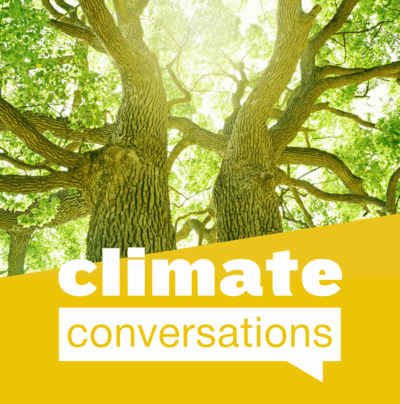
88% of Americans support climate action, but you’d never know it from our conversations.
Surveys consistently show that the majority of Americans support both individual and systemic climate action, but we underestimate just how many of our family members, friends, and colleagues feel the same.
The result is that we stay silent, which can look like indifference.
In fact, two-thirds of Americans rarely or never talk about climate change, even with our families and friends. Only one metropolitan area in the entire country has more than 50% of people who regularly discuss climate change – highlighting a widespread lack of conversation across urban, suburban, and rural communities.
But simply talking about climate change is one of the most impactful steps we can take.
It normalizes concern, makes action contagious, and helps connect the dots between global climate shifts and local impacts, from disappearing pollinators to rising heat and drought in our communities.
That’s why we’re launching “Climate Conversations,” a new initiative designed to help spark more meaningful dialogue about climate change, with one simple idea each month to get people talking.
Why talking about climate change is important
You may be surprised to learn that, according to an annual global survey by the European Investment Bank:
- 88% of Americans believe that adapting to climate change is important.
- 82% of Americans agree that climate change adaptation requires costs now to avoid greater costs in the future.
- 83% of Americans believe that investing in climate adaptation infrastructure can help create jobs and boost the local economy.
- 64% of Americans believe they have been directly and negatively impacted by extreme heat within the last five years.
- 63% of Americans believe they will have to adapt the way they live due to climate change.
Translating that broad support into action has been challenging because those same Americans think they are isolated in their support. Research indicates that bringing Americans’ perception in line with actual support is the key to catalyzing climate action.
For example, 75 percent of Americans support a carbon tax, a number that is certain to surprise most readers. We know it will be surprising because when Americans are asked, “What percentage of your fellow citizens support a carbon tax?” the average answer is 30 percent – the perceived social expectation – which is well under half the actual support.
Similar results can be seen in individual climate action, where reducing food waste enjoys 92% actual support but only 60% perceived support and solar panel installation, 60% actual support to 30% perceived support.
As Brett Jenks, CEO of Rare, who champions this research, wrote: “People perceive they’re more alone in believing more people should take climate-positive action than they really are. And if people don’t realize that those around them hold positive views of these climate actions, they are less likely to take climate action.”
How to get started
Next time you’re catching up with a friend, chatting with neighbors, or spending time with family, try weaving in a question or observation about how climate is affecting your local community. Has the weather felt different lately? Are pollinators or birds showing up earlier or not at all? Is wildfire smoke becoming a seasonal norm?
These openings can lead to meaningful conversations that connect climate change to the things people care about most: health, food, clean air, and a livable future. You don’t need to have all the answers. You just need to be willing to start.
Because the most impactful thing you can do for the climate? Talk about it.
Check out our monthly Climate Conversation articles for discussion topics, resources, and more:
July 2025 | Climate change can be solved, and Americans want to solve it
August 2025 | Personal stories can help save the planet
September 2025 | Trusted messengers
October 2025 | Community values
November 2025 | WildAid at TEDx
December 2025 | An acronym to help with holiday conversations
January 2026 | A guide for combatting climate misinformation
Stay in touch and get the latest WildAid updates.
SIGN UP
